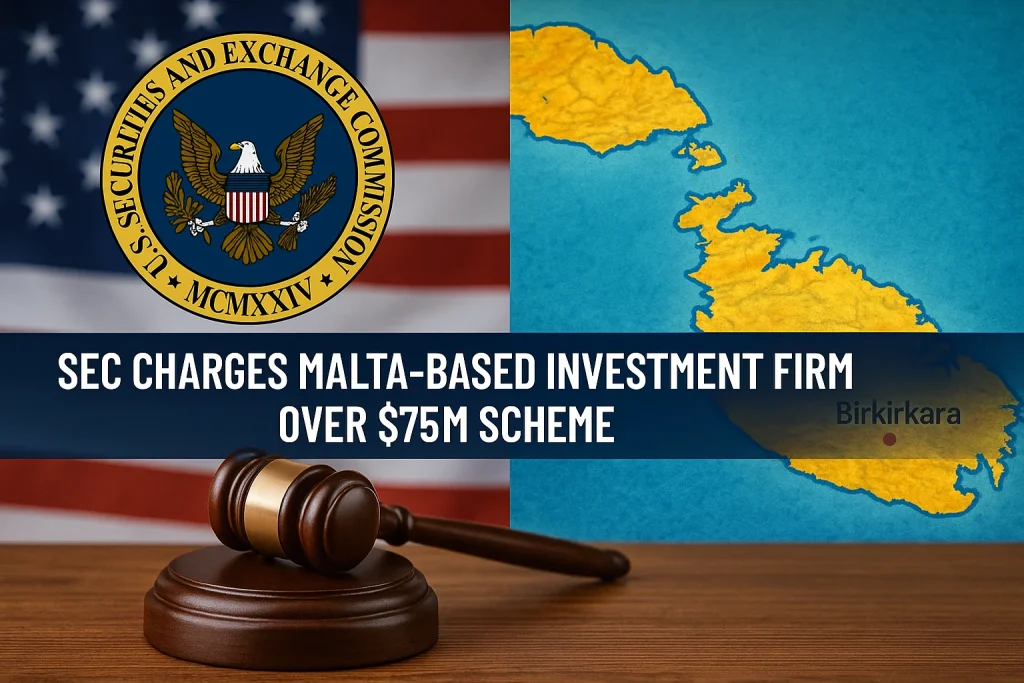Overview of the Case
Legal action has been initiated by the U.S. Securities and Exchange Commission (SEC) against Standard Advisory Services Limited, a licensed investment advisory company formerly operating out of Malta, along with two American executives, Gregory Lindberg and Christopher Herwig. The regulator claims that the trio took part in a financial scheme that resulted in over $75 million in client losses.
Standard Advisory was previously authorized by the Malta Financial Services Authority (MFSA) to offer investment services but later surrendered its license.
Allegations Filed in U.S. Federal Court
According to official court documents submitted to the Middle District of North Carolina, the SEC asserts that between July 2017 and 2018, Lindberg and Herwig used their positions at Standard Advisory to orchestrate transactions that were not disclosed to their clients and allegedly served personal financial interests rather than those of investors.
The SEC’s filing points to multiple violations of the Investment Advisers Act of 1940, including:
-
Failing to disclose conflicts of interest
-
Diverting client funds for unrelated business activities
-
Using complex and opaque investment structures to mask the movement of money
The agency seeks court orders that would impose financial penalties, require the return of unlawfully gained profits, and ban the defendants from similar conduct in the future.
Funds and Fees in Question
The SEC contends that the defendants misused over $57 million of investor funds. In addition, Standard Advisory reportedly earned $21.4 million in fees from these same activities. The regulator claims these revenues were tied to a broader scheme involving insurance-related investment vehicles controlled by the same parties.
To hide the nature and destination of the funds, Lindberg allegedly established a network of affiliated companies and funneled client capital into ventures he or his associates controlled.
The Company’s Structure and Leadership
Standard Advisory Services Limited operated from Birkirkara, Malta, and is listed as a subsidiary of Standard Malta Holdings Ltd. The ultimate parent entity is Global Health Technology Group LLC, incorporated in North Carolina, USA.
The firm’s board of directors includes:
-
Joseph Grioli (Malta)
-
Marc Howard Greenspan (USA)
-
Thomas Schildhammer (Sliema, Malta)
Former directors have included Christopher Herwig, Ray Busuttil, and Adrian Mallia. The company secretary is Miguel Cassar, with Grant Thornton listed as its auditing firm.
SEC’s Statement on the Matter
Osman Nawaz, head of the SEC’s Complex Financial Instruments Unit, commented on the situation:
“The defendants allegedly implemented a sophisticated financial strategy that leveraged complex investments and ownership structures to benefit themselves at the expense of their clients. The SEC is committed to holding them accountable for this breach of trust.” (source)
Regulatory Oversight and Questions in Malta
Despite the nature and scale of the activities described in the SEC complaint, no disciplinary action was reportedly taken by Maltese authorities during or after the period of activity. Standard Advisory’s license was eventually relinquished voluntarily, but no penalties or sanctions appear to have been applied.
At the time, the MFSA Executive Committee included several high-profile officials:
-
Joseph Cuschieri
-
Edwina Licari
-
Christopher Buttigieg
-
Michelle Mizzi Buontempo
-
Michael Xuereb
-
Ivan Zammit
Public records do not indicate any formal investigations or declarations of conflict of interest by these individuals in relation to the company.
Moreover, the Financial Intelligence Analysis Unit (FIAU)—responsible for monitoring money laundering and suspicious financial behavior in Malta—did not publicly reprimand or fine Standard Advisory.
Closing Remarks
The case involving Standard Advisory Services Limited illustrates the regulatory challenges associated with cross-border investment firms and highlights how gaps in oversight may allow questionable practices to go undetected. The outcome of the SEC’s civil action will likely provide further insight into how such cases are addressed under U.S. financial law.


